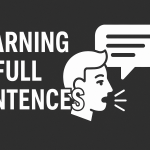Learning a foreign language is a challenging task because human languages are complex systems with thousands of words. For example, the English language contains about 170,000 words, of which native speakers use between 15,000 and 30,000.
To discuss more complex topics in English, mastering about 3,000 words is necessary. Although these represent only a small fraction of the entire vocabulary, memorizing their meanings can be challenging. Moreover, in language, words rarely appear isolated; they combine into sentences, and those into conversations. Not every combination of words is correct, and knowing how to form coherent sentences is crucial for effective communication.
Achieving fluency in a foreign language requires about 600 hours of study. However, there are factors that can accelerate this process.
Motivation and goals
Personal motivation is one of the most important, if not the most important, factor for success in learning a foreign language. Learning a language is a long and monotonous process. The results come only after some time. You need to find a lot of motivation to get through the periods when there is no progress, or progress is hard to see.
Willingness to learn a language, based on individual goals and needs, can significantly affect commitment and persistence in learning. Sometimes people learn a foreign language for external reasons, such as educational, professional or social requirements. While these factors can be important, personal motivation is often a more effective stimulus – for example, you may want to learn a language to impress a loved one.
To make the most of your motivation and not lose it, try to set specific goals. They can give you clear direction and help you determine exactly what you want to achieve. As a result, they can increase your commitment, consistency and persistence in learning. If you set specific milestones, it will be easier for you to monitor your progress. It’s worth using the so-called SMART technique, which assumes that goals should be Specific, Measurable, Achievable and Realistic. Dan Aurelii also writes about the power of goal setting in his book Irrational Predictability.
So don’t assume that your goal is to become proficient in a foreign language – such a goal is too general and it’s not clear how to measure it. Be precise and include your overall goal and language motivations.
- If you care about communication, for example, a good goal is to have three conversations in the language you’re learning, of at least 15 minutes each, about the holidays.
- If you are lacking in vocabulary then learn 20 food-related phrases by, say, next Saturday, so that you will be able to translate them all flawlessly from English to the target language. The more specific the better.
- If you want to become a foreign language teacher, explain the difference between past simple and present perfect to at least 3 people in a month, and ask them to explain it back to you after a week.
Of course, these are just examples; the point is to make your goals specific. That way it will be easier to stay motivated, and to notice your small successes.
It’s worth remembering that motivation, while important, is a fleeting thing. Often people get discouraged, especially if the time it takes to master a language is longer than they expected. If you feel that your motivation is fading, it’s worth reminding yourself of the goals you’ve set. Also, try to make your language sessions more varied so that you can attend to them more easily.
Use of appropriate memorization techniques
Intensive study of a foreign language does not always bring the expected results. Many students get discouraged because, even though they spend time studying, they don’t see results in learning a foreign language. The problem is that the “how” you learn has a huge impact on the results.
There are a number of techniques that accelerate language learning, commonly referred to as ‘mnemonics.’ A mnemonic is any type of mental technique that aids in organization and memorization and facilitates the acquisition of more information.
- Mental visualization techniques, such as the famous ‘Memory Palace,’ require the creation of a real or imaginary space that you are familiar with. For instance, if you can imagine your bedroom in great detail, you can place mental ‘stickies’ on objects to label them. For example, if you are learning Italian, you might imagine a yellow sticker on the door that says ‘la porta.’
- Spaced repetition is a memorization technique based on the idea of ‘spacing,’ which is one of the most fascinating effects in the history of experimental research on learning and memory. The main idea here is that you don’t learn everything at once, but rather split the material into parts and repeat them regularly, thereby extending the time between repetitions. So, if you are learning something today, you should repeat it tomorrow, then in three days, again in 7 days, and then in 15 days, etc. This spacing is known to move information into your long-term memory.
- Any activity that activates both brain hemispheres, like storytelling or listening to songs and music in the foreign language, is known to relax you and slow down your conscious memory, making language acquisition more natural. Additionally, humans are evolutionarily wired for stories; we are naturally drawn to them and tend to remember them better.
Regularity and intensity of learning
Every subject is worth learning systematically. In the case of foreign languages, however, regularity is key. Studying a language intensively for five hours once a month will not give you any results. A shorter but regular exercise will be much better. However, it can’t be just 5 or 15 minutes a day, as, for example, the developers of other language learning apps suggest. Such short sections can be helpful at the very beginning, when you want to build a habit and get “rolling.” Pretty soon, however, you should spend about an hour a day learning to see measurable results.
To learn a foreign language quickly, you also need to adjust the level of difficulty and intensity. The material can’t be too easy, so that you don’t get bored but instead make progress. On the other hand, it can’t be too difficult either, as this can discourage you and also block your progress.
In Taalhammer, our algorithm determines your level of language proficiency and adapts the materials and exercises to it, also analyzing the speed of progress. This way you achieve your goals and see the results. Only by seeing results will your motivation and desire continue.
Possibility to use the language in practice
People who put language into practice as early as possible learn faster. An app alone, even the best one, although a great support, will not teach you to communicate in a language. It will be great preparation for real conversations and will boost your confidence. However, for language acquisition to actually happen, you need to start using the language in real situations. Eventually, you have to start talking – if you only use the app all the time, you will certainly become a taskmaster with the app. However, to become a master of conversation, well… you have to start talking.
An online foreign language course with a native speaker, or a language tandem, can be a great place to practice your language skills, especially speaking. Using the language on a daily basis will accelerate your learning.
I know this from experience. After college, I went on a three-month internship in Murcia. I had never studied Spanish before and tried to learn it as quickly as possible. Besides, I didn’t have much of a choice, because almost no one in the city spoke English. Since I had to use the language every day, within three months I was able to communicate with Spaniards in everyday situations.
Putting yourself in situations where you will be forced to talk is an ideal way not only to practice, but also to see how your learning so far is working. A successful conversion is the greatest reward and proof that your efforts are paying off. This way your motivation will increase, and you will understand even better the need to speak as much and as quickly as possible in a foreign language. If you’re learning with an online tutor, it’s essential to find a tutor who will only communicate with you in the language you want to learn. It’s best if it’s a native speaker; that way you won’t have the option of resorting to English – when you’re forced to talk in a foreign language, you’ll quickly realize that you can do more than you thought.
As a person who has been learning various foreign languages for years, I have a piece of advice for you: accept as soon as possible that for a long time you won’t be able to speak in a foreign language as eloquently as in English. I myself very often felt downright stupid when I tried to put sentences together in Portuguese (and before that, in English). Despite my embarrassment, I continued the conversation. There is no choice but to use these embarrassing situations to your advantage. Believe, too, that native speakers are impressed that you are trying to express yourself in their language.
Age
For some people, age can affect the speed of learning. Does it seem to you that your child is able to learn a language faster and more efficiently than you?
Think of it this way. A 10-year-old child speaks his language perfectly, certainly when it comes to convincing a parent to buy him ice cream or a new phone. But does he or she have something specific to say about a non-trivial topic? I bet you can learn to talk about politics or sports history, for example, faster than in 10 years.
As an adult, you can enjoy various advantages that come with age, such as the ability to think logically, access educational resources, and employ analytical skills and experience. Learning for adults is not only effective, but also interesting, for example because it brings a greater understanding of culture and language context.
In the case of adults, of course, it is necessary to adapt learning practices and methods to bring the best results. If you want to know more read our article about learning a language at an older age.
Knowing other languages
If you already know a foreign language, you may find that learning another one becomes easier. This often depends on the languages you already speak; generally, the more similar the known language is to the new one, the easier the learning process. For example, if you speak German, learning Dutch will likely be easier for you than it would be for someone who only speaks Italian.
However, linguistic similarity is not the only factor at play. Once you have mastered a new language, you develop a repertoire of effective learning techniques and strategies. You become familiar with which routines work best for you in mastering a new language.
Furthermore, you will also come to understand that learning a language is more of a marathon than a sprint—it requires time, patience, and consistent dedication. This holistic approach not only makes the process more efficient but also enhances your ability to tackle the nuances and complexities of a new language
Understanding the context
When discussing vocabulary, you often hear about the ‘core’ and the ‘periphery.’ The core consists of the 1000 most frequently used words, which you can easily find listed on numerous websites. However, if you only learn these core words, your understanding of the language will be minimal, close to 0%. Why? Because these words typically function as fillers in the language. It’s the remaining 20% of the vocabulary, known as the peripheral vocabulary, that carries the true meaning. Each person has unique linguistic needs based on their interests. For instance, the language used by a musician differs from that used by an engineer or a businessman. What unites them is the core vocabulary, but their specific needs diverge in the periphery.
It’s essential not just to learn the core but also to focus on your personal periphery. For example, if your partner is interested in botany, you should familiarize yourself with terms commonly used in a flower shop, such as ‘a bouquet of roses’ or ‘wrapped up in paper.’ If you’re a football enthusiast, phrases like ‘to be offside’ or ‘to shoot a penalty kick’ should be part of your vocabulary. Concentrate on phrases and sentences that relate to your interests or about which you can speak fluently in your native language.
We designed Taalhammer with this specific need in mind. Taalhammer’s Creator uses AI to help you develop a personalized course tailored to your lifestyle. You can choose from over 100 topics and search through a database of a few million example sentences to truly make the learning relevant to your experiences.







